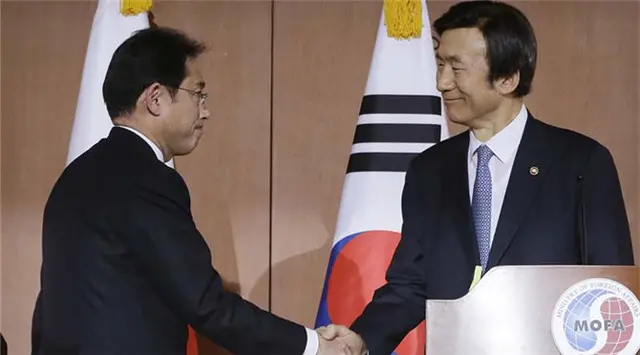South Korea and Japan reached a final, irreversible agreement on Japan's wartime sex slavery of Korean women, but complaints remained as Seoul failed to extract Tokyo's acknowledgement of "legal" responsibility for the war crime.
South Korean Foreign Minister Yun Byung-se and his Japanese counterpart Fumio Kishida met on Monday in Seoul to settle the long-standing row over the issue on comfort women, a euphemism for Korean women forced to serve in Japan's military brothels during World War II.
Kishida read a statement that "Prime Minister Shinzo Abe expresses apology and remorse from the heart" for all the people suffering hard-to-cure wounds and many pains physically and psychologically.
The phrase of "apology and remorse from the heart" has been used by Abe frequently.
The statement said "the Japanese government strongly feels responsibility" for the comfort women from the perspective that honor and dignity of many women were deeply scarred "under the involvement of" the Imperial Japanese Army.
The statement, however, failed to clearly stipulate the "legal responsibility," which the comfort women victims have called on the Abe cabinet to express.
Lee Yong-Soo, 88, one of 46 living South Korean victims, was dissatisfied with the agreement, telling reporters that she would dismiss all of what the foreign ministers agreed.
Complaining about the absence of legal responsibility, she requested Japan's damages for the war crime rather than conciliatory compensation. Lee said she already had enough money to live on, adding that it was not a matter of monetary assistance.
Under the agreement, Japan pledged to offer 1 billion yen (8.3 million U.S. dollars) from its government coffers to help South Korea establish a foundation supporting the former sex slaves.
Historians estimate as much as 200,000 women, mostly from the Korean peninsula, forced into the sexual slavery. Among 238 South Koreans who identified themselves as former sex slaves, only 46 are alive as their average age is 89.
Kishida told Japanese reporters after the meeting that the money to be offered is not damages for the crime, saying that there was no change in its position that claims over property were settled between the two countries in a 1965 treaty.
The treaty, which normalized diplomatic ties between Seoul and Tokyo after the latter's colonization of the former from 1910 to 1945, has been cited by Japan as a key reason for its exemption from legal responsibility.
South Korea has claimed that individual claims over damages for the war crime had yet to be resolved. South Korea received a total of 800 million U.S. dollars in grants and loans from Japan in 1965.
A local association advocating the comfort women victims denounced the agreement as "diplomatic compromise," saying that South Korea confirmed a resolution despite Japan's ambiguity in apology.
The top South Korean diplomat said that Seoul confirms the "final and irreversible" settlement of the issue on the premise that Tokyo will meet its pledges sincerely, promising to refrain from criticizing Japan over the issue.
Touching on Japan's call for the removal of a "girl statue" symbolizing the comfort women being erected in front of the Japanese embassy in Seoul to elsewhere, Yun said Seoul will make efforts to properly resolve it through talks with related civic groups.
The statue, staring at the Japanese embassy, was erected in 2011 only with citizens' donations to mark the 1,000th rally, held every Wednesday, to call for Japan's sincere apology. There are 24 such statues at home and nine in the United States.
The comfort women victims have claimed that it was not a matter of discussion between governments because it was erected by citizens and symbolizes South Korea's painful history.
Though complaints remain, the South Korean government seems to believe that Japan "effectively" admitted to its legal responsibility for the war crime given the 1- billion-yen fund out of the Japanese budget.
South Korean President Park Geun-hye received a telephone call from Abe on Monday, saying that she hoped a close cooperation with Japan to open a new bilateral relationship and build trust based on the agreement, according to her office.
The agreement is expected to improve the frayed Seoul-Tokyo ties, but Park may face strong backlash at home as she has pledged an agreement acceptable to the victims and understandable to the public.
 简体中文
简体中文




